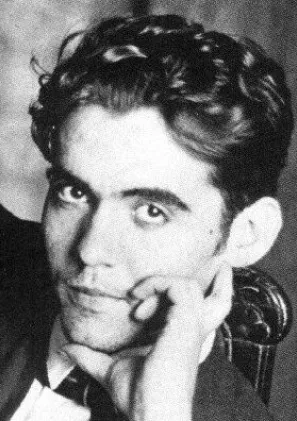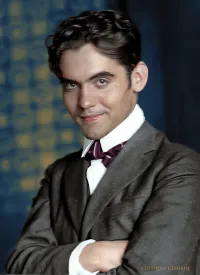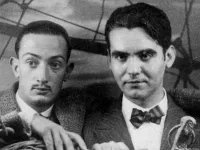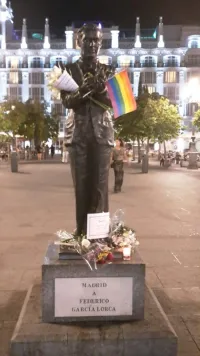Biography
1898 - 1936
“The artist, and particularly the poet, is always an anarchist in the best sense of the word. He must heed only the call that arises within him from three strong voices: the voice of death, with all its foreboding, the voice of love and the voice of art.”
- Federico Garcia Lorca
García Lorca achieved international recognition as an emblematic member of the Generation of '27. Originally from Granada, he moved to Madrid in 1919 where he became part of Spain's avant-garde. From 1925 to 1928 he was passionately involved with Salvador Dalí, though it is said Dalí rejected his erotic advances. His heavily homoerotic Sonnets of Dark Love, written in November 1935 and shared only with close friends, were lost until 1983 when they were finally published in draft form. When Five Years Pass (Así Que Pasen Cinco Años, 1931), Blood Wedding (Bodas de Sangre, 1932), Yerma (1934), Diván del Tamarit (1931–1936) and House of Bernarda Alba (La Casa de Bernarda Alba) are generally regarded as his major works. Though he escaped the Spanish Civil War by moving back to Granada, he was arrested and assassinated on August 19, 1936 by the Nationalist militia. Significant controversy remains about the motives and details of his death including suggestions that he was targeted because of his sexual orientation, while others assert it was part of a political purge. Following his death García Lorca came to be lionized as "The finest poet of Imperial Spain." In spite of numerous exhumations, his remains have never been found. García Lorca is honored by a statue prominently located in Madrid's Plaza de Santa Ana.
1898 - 1936
“The artist, and particularly the poet, is always an anarchist in the best sense of the word. He must heed only the call that arises within him from three strong voices: the voice of death, with all its foreboding, the voice of love and the voice of art.”
- Federico Garcia Lorca
García Lorca achieved international recognition as an emblematic member of the Generation of '27. Originally from Granada, he moved to Madrid in 1919 where he became part of Spain's avant-garde. From 1925 to 1928 he was passionately involved with Salvador Dalí, though it is said Dalí rejected his erotic advances. His heavily homoerotic Sonnets of Dark Love, written in November 1935 and shared only with close friends, were lost until 1983 when they were finally published in draft form. When Five Years Pass (Así Que Pasen Cinco Años, 1931), Blood Wedding (Bodas de Sangre, 1932), Yerma (1934), Diván del Tamarit (1931–1936) and House of Bernarda Alba (La Casa de Bernarda Alba) are generally regarded as his major works. Though he escaped the Spanish Civil War by moving back to Granada, he was arrested and assassinated on August 19, 1936 by the Nationalist militia. Significant controversy remains about the motives and details of his death including suggestions that he was targeted because of his sexual orientation, while others assert it was part of a political purge. Following his death García Lorca came to be lionized as "The finest poet of Imperial Spain." In spite of numerous exhumations, his remains have never been found. García Lorca is honored by a statue prominently located in Madrid's Plaza de Santa Ana.
Demography
Demography
Gender Male
Sexual Orientation Gay
Gender Identity Cisgender
Ethnicity Latinx
Nations Affiliated Spain United States Cuba
Era/Epoch Roaring Twenties (1920-1929)
Field(s) of Contribution
Author
Poet
Theater
Commemorations & Honors
Bronze Statue of Lorca Located in Madrid's Plaza de Santa Ana
Parque Federico García Lorca Dedicated to His Memory
Generation of 1927 Member
Centro Federico García Lorca in Madrid Built by the Fundación Federico García Lorca
Google Doodle Commemorating García Lorca's 115th Birthday (2013)
Inaugural San Francisco Rainbow Honor Walk Honoree (2014)
Demography
Gender Male
Sexual Orientation Gay
Gender Identity Cisgender
Ethnicity Latinx
Nations Affiliated Spain United States Cuba
Era/Epoch Roaring Twenties (1920-1929)
Field(s) of Contribution
Author
Poet
Theater
Commemorations & Honors
Bronze Statue of Lorca Located in Madrid's Plaza de Santa Ana
Parque Federico García Lorca Dedicated to His Memory
Generation of 1927 Member
Centro Federico García Lorca in Madrid Built by the Fundación Federico García Lorca
Google Doodle Commemorating García Lorca's 115th Birthday (2013)
Inaugural San Francisco Rainbow Honor Walk Honoree (2014)
Resources
Resources
Anderson, Andrew. Lorca's Late Poetry: A Critical Study. Leeds: Francis Cairns Publications, 1990.
Binding, Paul. Lorca: The Gay Imagination. London: Gay Men's Press, 1985.
Eisenberg, Daniel. "Reaction to the Publication of the Sonetos de amor oscuro." Bulletin of Hispanic Studies 65 (1988): 261-271.
Gibson, Ian. Federico García Lorca: A Life. New York: Pantheon Books, 1989.
Harris, Derek. García Lorca: Poeta en Nueva York. London: Grant and Cutler, 1978.
Londré, Felicia Hardison. Federico García Lorca. New York: Ungar, 1984.
Sahuquillo, Angel. Federico Garcia Lorca and the Culture of Male Homosexuality.
Jefferson, N.C.: McFarland & Company, 2007.
https://en.wikipedia.org/wiki/Federico_Garc%C3%ADa_Lorca
https://www.newyorker.com/books/page-turner/lorca-and-the-gay-world
https://www.theguardian.com/culture/2018/nov/10/spain-gay-lorca-graphic-novel
https://culturacolectiva.com/art/federico-garcia-lorca-and-salvador-dali-relationship
Resources
Anderson, Andrew. Lorca's Late Poetry: A Critical Study. Leeds: Francis Cairns Publications, 1990.
Binding, Paul. Lorca: The Gay Imagination. London: Gay Men's Press, 1985.
Eisenberg, Daniel. "Reaction to the Publication of the Sonetos de amor oscuro." Bulletin of Hispanic Studies 65 (1988): 261-271.
Gibson, Ian. Federico García Lorca: A Life. New York: Pantheon Books, 1989.
Harris, Derek. García Lorca: Poeta en Nueva York. London: Grant and Cutler, 1978.
Londré, Felicia Hardison. Federico García Lorca. New York: Ungar, 1984.
Sahuquillo, Angel. Federico Garcia Lorca and the Culture of Male Homosexuality.
Jefferson, N.C.: McFarland & Company, 2007.
https://en.wikipedia.org/wiki/Federico_Garc%C3%ADa_Lorca
https://www.newyorker.com/books/page-turner/lorca-and-the-gay-world
https://www.theguardian.com/culture/2018/nov/10/spain-gay-lorca-graphic-novel
https://culturacolectiva.com/art/federico-garcia-lorca-and-salvador-dali-relationship



